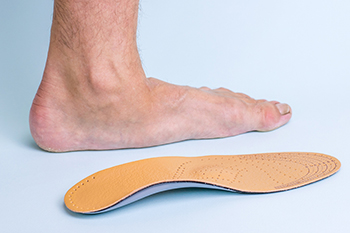
Flat feet, sometimes called fallen arches, occur when the arches of the feet collapse, causing the entire sole to touch the ground. This condition can lead to pain in the midfoot, especially after standing or walking for long periods. Other symptoms include swelling, foot fatigue, and even pain in the lower legs, knees, or lower back, as flat feet can affect your posture and gait. A variety of factors, including genetics, injury, obesity, or conditions like arthritis can cause flat feet. Over time, the lack of proper arch support can lead to increased strain on the muscles and joints in the feet. Treatment options for flat feet often include custom orthotics, which provide better arch support, stretches, strengthening exercises, and proper footwear. In some cases, surgical intervention may be necessary. A podiatrist can evaluate your condition and recommend the best treatment plan. If you are experiencing foot pain, it is suggested that you make an appointment with a podiatrist.
Flatfoot is a condition many people suffer from. If you have flat feet, contact one of our podiatrists from BayCity Associates in Podiatry . Our doctors will treat your foot and ankle needs.
What Are Flat Feet?
Flatfoot is a condition in which the arch of the foot is depressed and the sole of the foot is almost completely in contact with the ground. About 20-30% of the population generally has flat feet because their arches never formed during growth.
Conditions & Problems:
Having flat feet makes it difficult to run or walk because of the stress placed on the ankles.
Alignment – The general alignment of your legs can be disrupted, because the ankles move inward which can cause major discomfort.
Knees – If you have complications with your knees, flat feet can be a contributor to arthritis in that area.
Symptoms
- Pain around the heel or arch area
- Trouble standing on the tip toe
- Swelling around the inside of the ankle
- Flat look to one or both feet
- Having your shoes feel uneven when worn
Treatment
If you are experiencing pain and stress on the foot you may weaken the posterior tibial tendon, which runs around the inside of the ankle.
If you have any questions please feel free to contact our offices located in Erie, PA and Meadville, PA . We offer the newest diagnostic and treatment technologies for all your foot and ankle needs.
